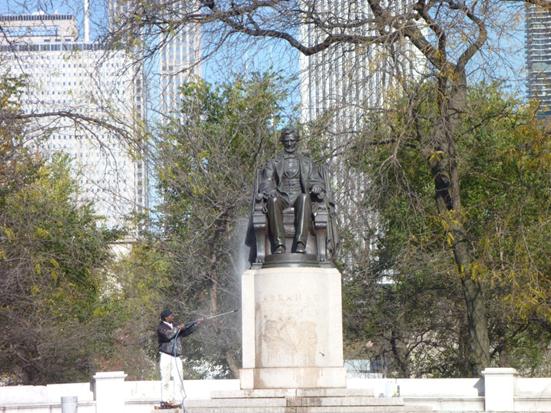This is my public apology for not yet having emailed to thank all the wonderful people I met in Chicago (I’ve started it on the train home tonight).
The last two days of my trip (18/19th Nov) involved even more rushing around, but thankfully more of it on the brilliant El trains/subway rather than Shanks’ pony.
First up, Phil Nyden at the Centre for Urban Research & Learning at Loyola University, one of those academics that makes you acutely grateful for education, for allowing people like him to be working collaboratively with communities like those I’ve glimpsed in Chicago. He’s even done some work back here I discovered – for our own Locality member, Birmingham Settlement, which was founded in 1899 in partnership with Chicago’s Association House.

So we got talking and here are a few of my notes:
Why is the Government resourcing the Community Organisers programme? I try out Toby Blume’s theory that it’s to promote “creative disruption” to local vested interests, especially local authorities. Phil says Johnson’s War on Poverty in the 1960s was a federal intervention aimed to deal with city political systems that were “ossified at best, more often corrupt”. Of course the cities didn’t like it and they closed it down. Those community organisers became heads of non-profits. There was a demographic shift as cities became majority black and a political shift as they elected their first black mayors. The economy was doing well but the cities were starved of resources. Federal government intervention and $$$ have made a difference. But the credibility of elected officials is now at its lowest ebb ever.
One of the important aspects of ABCD (asset based community development) is its focus on land, buildings and money (the things that power is made of). For as long as the community sector spends all its energies on direct service provision, on social support, and on mitigating the impacts of decisions about land, buildings and money, it will never have any power in the proceedings. The sector often does have ‘skin in the game’ but it always plays by someone else’s rules. For me, community organising is a way to make that ‘skin’ real – to bring the mandate to life through mobilising.
We talked about the common ground and differences between development trusts and community development corporations. This has come up over and over during the visit, although because I was focusing on community organising I didn’t explore it properly on the ground. From what I can tell, CDCs have a chequered history with highs and lows a bit too closely attached to mainstream politics and economics for my liking. I think that in general (and it’s a big generalisation) DTs are more independent, agile, community rooted, innovative, less able to rely on aldermen’s handouts or a widespread public programme. The common ground might be the focus on rebuilding the physical neighbourhood and making real gains in facilities and amenities, as part of a commitment to social and environmental justice.
But Phil says CDCs were riding high but never super-strong and many have collapsed. They were focused on affordable housing and understood how to do it in a rising market. What to do with no resources? In El Salvador “NGOs are doing stuff with virtually no resources, stretching super-minimal budgets”. How to tame gentrification? Set up the asset lock when the neighbourhood is down, then buy and build – not housing for the poor but housing people will want to stay in. CURL works on diverse, stable neighbourhoods. Phil says the lock-in has to be founded in organising as well as legal. How do you get the community organising to feel good enough that people will do it over and over – “every generation has to win it again. ”
What about settlement houses? Gentrification is an issue for them too. Should they stay in an area once the low-income people who need them most have been displaced? Provide mixed income services? Or sell and move to where the poor have gone? Association House moved, so did Hull-House. Others stay put and serve a wider catchment of low-income people throughout satellite services.
Just like everybody I met in the States, Phil gave me loads of contacts and resources – only his were sociology books and I feared I may be overweight! But the best thing he gave me was just two words – “grounded theory”. This is apparently a legitimate sociological approach in which “you go in as a trained sociologist [or a trained organiser] with no hypothesis, just a sense of what’s going on, and set out to discover.” All day that resonated. It seemed to fit with the wilful unpredictability of organising, the refusal to bring messages, the rejection of specified outcomes. We need to make this case to our foundations – the grounded theory of grant-making!
I zipped back down the red line to meet Jim Field at the Chicago Coalition for the Homeless on East Lake (new offices, fab donated furniture). Jim told me his story – disarmingly. I’ll write it up for the next post (rather than rushing this one).


We done some of this grounded theory gubbins in Leeds with a bunch of folks wanting to know more about mental health and substance use in different bme communities http://dual-diagnosis.org.uk/DD.BME.Consultation.pdf
Not sure about your take on ABCD though. The fixed-asset based version of ABCD seems an odd interpretation of John Mcknight’s work – which largely focuses on the social capital we produce and can leverage – even when we don’t actually own/control stuff.
This certainly seems to be the norm in ABCD practitioners in Europe (Cormac et al http://abcdeurope.ning.com/) – especially amongst those of us who come to this from a dis/ability perspective
Anyhoo – glad you had a nice time in Chicago, and glad ABCD is gaining some ground on this side of the pond. We need more of this not less.
Dear Jon
Thanks for your comments and links.
I should say that this blog is just a first download of some particular things that struck me in each meeting. I have been reflecting further on it ever since.
My comments on land, buildings and money were not an interpretation of John Mcnight’s work but a reflection on my own experience. What i have loved most about working first for DTA and then for Locality is the focus on the physical aspect of power and survival. This is never to say that the soft tissue of *people* is not the most important asset, but that the hard stuff is what we live among and if we can’t control what happens to that we will feel punched in the gut every time it is abused under our noses (I’ve been there too many times and cried).
Best wishes
Jess
Oh, I should also have said that John McKnight would shiver at the prospect of investing in direct services. His book http://www.amazon.co.uk/Careless-Society-Community-Its-Counterfeits/dp/0465091261 changed my life and is a vision of Big Society 15 years before the policy wonks around Cameron thought up the name.
Services, professionals and experts are the enemy of strong communities. As GBS said: All professions are conspiracies against the laity.
I wouldn’t shiver with John Mcknight about investing in direct services – for the reasons I gave. My inspirations include Margaret McMillan, who set up the world’s first nursery in Deptford (SE London), and indeed went on to set up the world’s first training college for early years workers – professionalisation of a caring role if ever there was one. The argument that this work is important, and it’s not just something women do ‘naturally’, was crucial. Like Jane Addams, McMillan was a pioneer thinker as well as doer. No-one can ever take that away, however cynical we might be about the century-later results. Direct services do not have to be paternalist (or even maternalist) – they can be invented from the ground upwards, DIY self-help solutions that mirror need because necessity is the mother of invention and change over time because they are properly rooted in the place they serve.
Jess